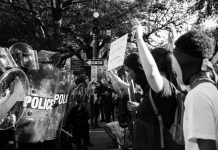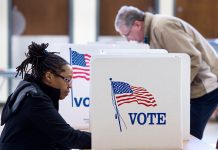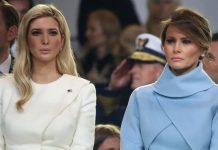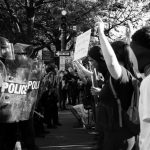The Supreme Court heard the case of a Colorado baker, Jack Phillips, who faced a lawsuit after he refused to bake a cake for a same-sex wedding in 2012. The reports on the outcome leave the future of civil rights for LGBTQ people in American in doubt, though we won’t likely know what the court rules until sometime in June.
The highest court in the land just ruled to allow discrimination against Muslims with the latest version of Trump’s travel ban, so it possibly portends a ruling that will allow discrimination against LGBTQ people as well.
Joy Reid, of MSNBC’s AM Joy, commented on the grim events of one day.
So in one day:
– Way cleared to turn national monuments over to drillers and strip miners…
– SCOTUS stacked by Mitch McConnell's unprecedented move to hold a seat hostage until there was a Republican POTUS approves Muslim ban…
– Trump's lawyer says POTUS is above the law.— Joy Reid (@JoyAnnReid) December 4, 2017
The Justice editor at Think Progress, Ian Millhiser, commented on the SCOTUS hearing today, and he seems to think the court will side with the anti-gay baker.
https://twitter.com/imillhiser/status/938084020176478210
Millhiser’s play-by-play on the hearing would sound almost humorous and ridiculous if it weren’t for the fact that civil rights hang in the balance. One of the premises of the case is that cake baking is a creative expression protected by the 1st amendment and free speech. But that calls into question if a florist, a makeup artist, a hairstylist, or other business would similarly be excused to discriminate based on their right to free speech.
Why would a baker be excused, but not a chef? These were the sort of issues before the Supreme Court.
The lawyer for Philips, Alliance Defending Freedom’s Kristen Waggoner, said that makeup “is not speech,” yet baking a wedding cake should have special consideration. The old “special rights” phrase that religious conservatives threw around before same-sex marriage became legal nationwide comes to mind.
Justice Kagan noted some people might say that baking a cake isn’t free speech any more than doing makeup.
When Waggoner tried to explain her distinction by claiming that makeup “is not speech,” Kagan clapped back that “some people will say that about cakes.”
Indeed, professionals might wonder why their line of work is protected as free speech, while others are not. Waggoner then argued that racist cake bakers would still be forced to bake cakes for interracial couples, saying, in that case, it “would be based on who the person is not the message.” So her stance relies on the idea that being LGBT is not part of who a person is, which is absurd.
The Trump administration Justice Department filed a brief on behalf of the cake baker that switched the argument from “religious freedom” to “a form of expression” protected by free speech. That re-opened the case with the SCOTUS, but after Waggoner’s arguments seemed destined to cement LGBT civil rights, Justice Kennedy was swayed to re-examine the if the ruling against the baker was showing hostility to religion.
The return to the good ole’ “religious freedom” topic came after Colorado Solicitor General Frederick Yarger called religion-based discrimination “despicable.” Kennedy found that objectionable and went on to lecture Yarger on why the state should be more “tolerant” to Mr. Phillips and suggested that the same-sex couple could have gone elsewhere to find a cake.
You know, like a Muslim, African American, or fill-in-the-blank minority should just go down the street if they are denied service at a florist shop?
“Religious freedom” seems to be the main thrust of the argument after all, as soon as the free speech argument became muffled –like talking with a mouthful of so much wedding cake.
Predictably, Trump’s pick for the SCOTUS, Neil Gorsuch, “piled on” when it came back to religion.
“Gorsuch, for his part, claimed that a second commissioner showed improper bias when they said that a person with religious beliefs that conflict with a civil rights laws may have to compromise those beliefs,” wrote Millhiser.
We’ll have to wait for the ruling to be sure what the turnout will be. Will the Supreme Court open up the doors to more needless discrimination in America based on religion? Millhiser seems to believe that they just might, failing to protect minority citizens as Trump works to place ever-more conservatives in lifelong court appointments, which would guarantee “sweeping immunity from the rule of law,” so long as you are in the majority and Christian.
Featured image: Neil Gorsuch and Anthony Kennedy via Wikimedia Commons with Cake via Pixabay










